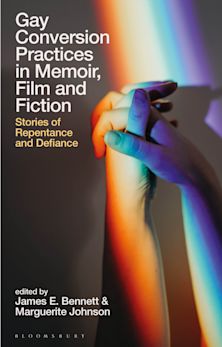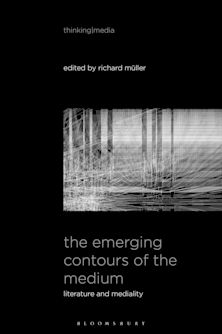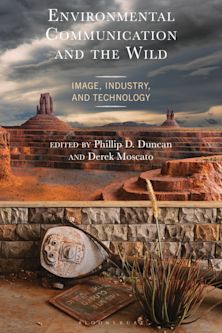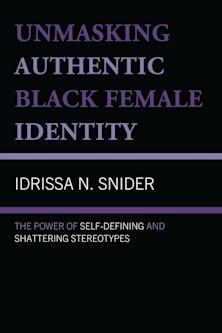- Home
- ACADEMIC
- Film & Media
- Film and Media Studies - Other
- Politics, Discourse, and American Society
Politics, Discourse, and American Society
New Agendas
Roderick P. Hart (Anthology Editor) , Bartholomew Sparrow (Anthology Editor) , Vanessa Beasley (Contributor) , David Crockett (Contributor) , Jill Edy (Contributor) , Jeffrey P. Jones (Contributor) , Regina Lawrence (Contributor) , Lisbeth Lipari (Contributor) , Shawn J. Parry-Giles (Contributor) , Amy Pool (Contributor) , David Ryfe (Contributor) , J H. Snider (Contributor) , Bartholomew Sparrow (Contributor) , Paul Waldman (Contributor)
- Textbook
Politics, Discourse, and American Society
New Agendas
Roderick P. Hart (Anthology Editor) , Bartholomew Sparrow (Anthology Editor) , Vanessa Beasley (Contributor) , David Crockett (Contributor) , Jill Edy (Contributor) , Jeffrey P. Jones (Contributor) , Regina Lawrence (Contributor) , Lisbeth Lipari (Contributor) , Shawn J. Parry-Giles (Contributor) , Amy Pool (Contributor) , David Ryfe (Contributor) , J H. Snider (Contributor) , Bartholomew Sparrow (Contributor) , Paul Waldman (Contributor)
- Textbook
Buy from Bloomsbury eTextBooks
You are now leaving the Bloomsbury Publishing website. Your eBook purchase will be with our partner https://www.vitalsource.com.
Your credit card statement will show this purchase originating from VitalSource Technologies. They will also provide any technical assistance you might require.
You must sign in to add this item to your wishlist. Please sign in or create an account
Description
What is the purpose of public talk in a democratic society? Do the American people interact with their government in distinctive ways? Are the nationOs mass media helpful or harmful to the democratic experience? In Politics, Discourse, and American Society, some of the nationOs best young scholars take us beyond conventional perspectives to present original work on how politics is transacted in American society and how public communication affects those transactions. They also lay out directions for future research, thereby putting fresh ideas on the scholarly agenda. The authors ask whether the American president is genuinely powerful, if lawsuits have become a way of changing the nationOs politics, whether public opinion polling is really objective, and whether politics can still be distinguished from pop culture.
Table of Contents
Part 2 Part I: Presidential Discourse in a Complex Nation
Chapter 3 Identity, Democracy, and Presidential Rhetoric
Chapter 4 Prometheus Chained: Communication and the Constraints of History
Part 5 Part II: National Beliefs and Political Identity
Chapter 6 Using the Past in Political Discourse
Chapter 7 Rights Talk As Political Communication
Part 8 Part III: The Mass Media and Lay Understanding
Chapter 9 Meaningful Events: Problem Definition in the Media Arena
Chapter 10 The Paradox of News Bias: How Local Broadcasters Influence Information Policy
Part 11 Part IV: Enlarging the Public Sphere
Chapter 12 Voice, Polling, and the Public Sphere
Chapter 13 Deliberation in Practice: Connecting Theory to the Lives of Citizens
Part 14 Part V: Popular Venues, Popular Politics
Chapter 15 Presidential Communication As Cultural Form: The Town Hall Meeting
Chapter 16 Forums for Citizenship in Popular Culture
Chapter 17 Political Authenticity, Television News, and Hillary Rodham Clinton
Product details
| Published | 13 Jun 2001 |
|---|---|
| Format | Ebook (Epub & Mobi) |
| Edition | 1st |
| Extent | 280 |
| ISBN | 9781461705215 |
| Imprint | Rowman & Littlefield Publishers |
| Publisher | Bloomsbury Publishing |
About the contributors
Reviews
-
Hart and Sparrow bring together some of the best young minds on political communication, resulting in a series of essays that are provocative and original in their insights. The authors challenge many aspects of conventional understanding and show how outlets from presidential town meetings to talk shows have important political ramifications.
Darrell M. West, Brown University
-
This richly rewarding volume, authored by a bevy of promising young scholars, presents novel insights into the complex interplay of political discourse and cultural forces. It's fun to read, stimulating to ponder, and bound to spark fruitful new approaches to political communication research.
Doris Graber, University of Illinois at Chicago
-
The contributors collectively reach beyond simple models of media effects. . . . These fresh perspectives on the complexity and significance of political communications offer much food for scholarly discussion.
Choice Reviews
-
A splendid collection of diverse personal agendas.
Political Communication
-
This is an edgy book, setting for itself the goals of understanding the political agendas of politicians, journalists, and citizen activists in a new century and of pushing fellow scholars into new conceptual territories. Both goals are fulfilled splendidly.
Bruce Gronbeck, University of Iowa



































